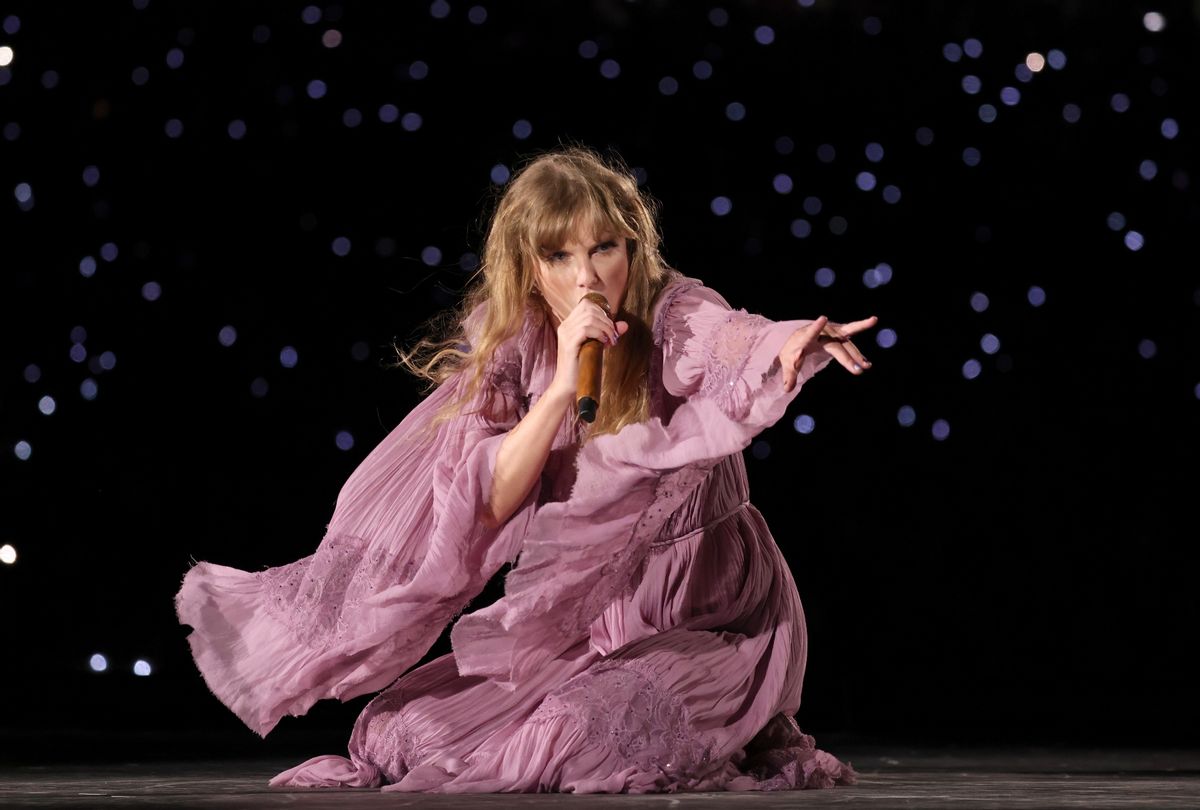Lyrics are Taylor Swift’s thing. Songwriting is literally the whole point of her sprawling 11th studio album “The Tortured Poets Department.”
While Swifties, critics and the general public have begun analyzing her massive 31-song dual album since its release on April 19, a few lines have stuck out and have been widely circulated, criticized and memed online. At the scene of the crime is “I Hate It Here,” one of the extra 15 tracks on the second album, “The Anthology.”
Oh yeah, that’s a real lyric from a self-proclaimed tortured poet.
In the song’s lyrics, Swift tells listeners she escapes into “secret gardens in my mind” because she hates it here. And because she hates it here, she mentions that she used to play a game with her friends to escape. The game entailed picking a decade they wished they could live in instead of their current reality. The musician sings, “I’d say the 1830s but without all the racists and getting married off for the highest bid.”
Oh yeah, that’s a real lyric from a self-proclaimed tortured poet. Almost immediately, the lyric was met with backlash, mostly from people who questioned Swift’s ideas about America’s reprehensible history with racism and slavery — generally the plight of Black people in 1830s America. The song overall is supposed to act as a vessel to highlight that nostalgia is a “mind’s trick” and even going back to the 1830s “was never even fun” and she’d hate it there.
Writer Ola Ojewumi shared her sentiments on the song: “When white women are congratulated for the ‘work’ of no longer feeling nostalgic about wanting to live in the 1830s. That’s not work, lol. Only white people fantasize about going back in time.”
With all this in mind, was it necessary for a white female musician to write lyrics that recall such a specific and painful time for most Black and nonwhite Americans, especially when said singer’s track record with allyship is murky at best? The answer is pretty clear to me.
If we are talking about the singer’s most recent offense, Swift’s ex, 1975 frontman Matty Healy, almost put her meteoric rise at risk last year. Their short-lived fling is part of the breakup fodder on her album as she compares Healy to a “tattooed golden retriever.” However, Healy isn’t that harmless or affable. He’s widely known as an internet edgelord, who deleted his X account after tweeting a slur about the Phoebe Bridgers-led band Boygenius, “I told Lucy Dacus that ‘Boygenius’ had inspired me and George [Daniel] to start a new band called ‘Girlr*tard.'”
His crude and frankly bigoted language is a part of Healy’s divisive appeal. As Salon contributor Kelly Pau wrote, “He’s not interested in political correctness. He used to follow Kyle Rittenhouse on Instagram. He jerks off to and jokes about Ghetto Gaggers, a porn website that focuses on the brutalization of Black women.”
I was in the audience as she brought up her Black friend to perform “Karma” during the New Jersey tour dates during the Eras Tour.
But what stumped the public was a podcast episode the singer did with Adam Friedland and Nick Mullen. During the episode, Healy laughed alongside the hosts as they ridiculed the Nigerian and Dominican rapper Ice Spice, calling her “Inuit Spice Girl” and “Chubby Chinese Lady.” Afterward, Healy had become a pariah, and Swift had to jump out of the predatory waters before his jagged teeth left her bleeding out. The singer, who came out as a feminist in 2014, broke up with Healy after a whirlwind two months and featured Ice Spice in one of her songs. I was in the audience as she brought up her Black friend to perform “Karma” during the New Jersey tour dates during the Eras Tour.
Nonetheless, the singer’s smart or damning PR move, depending on who you ask, worked. Her angry, loyal fans were placated, although her critics had labeled her a white feminist — a term that has followed her for years. A year later, the same conversations still surround the singer’s larger white identity and lack of understanding of the nonwhite, Black American experience. A line like, “I’d say the 1830s but without all the racists” is a loaded statement from someone who kept her liberal politics a secret until 2018 when it felt like her rights as a white woman being stripped away.
Even if we put aside her liberal politics — her advocacy for the LGBTQ+ community, and women’s rights or galvanizing young people to vote — her whiteness is ever-present as she writes that she finds a connection to an era so rife with suffering for nonwhite people. She knew we all knew the implications of saying she would like to return to this period. So of course, she had to add a clarifier to cover all her bases but what she failed to recognize is that for nonwhite people, especially Black Americans, the legacy of genocide, slavery and systemic racism is not a thing of the past but haunts us in the present in 2024. There’s no escaping it, even in Swift’s imaginary, sanitized world.
Read more
about Taylor Swift

